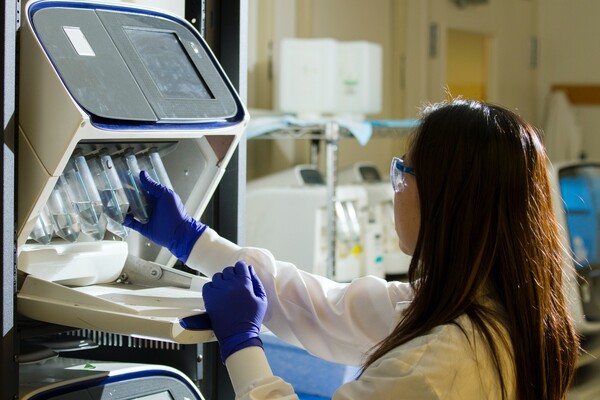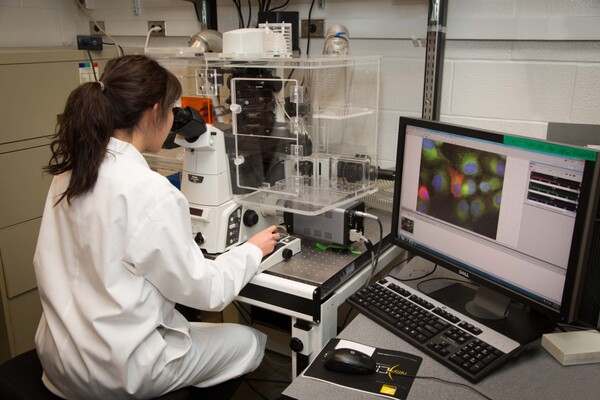
Main Second Level Navigation
Breadcrumbs
- Home
- Future Students
- Graduate Education
- Explore our Graduate Programs
- Thesis-Based Programs
- Molecular Genetics
Molecular Genetics
MSc & PhD
The MSc and PhD graduate programs in the Department of Molecular Genetics draw students from across Canada and around the world. A central feature of our program is our rotation system, which allows newly admitted students to experience three different labs before deciding on a "best fit" thesis lab. We are the first and remain among the few programs in Canada to offer such a matching system. To support our students throughout their degrees, as part of the Temerty Faculty of Medicine, we also offer the largest stipend in Canada of all comparable degrees in medical science research.
Recruiting students from a variety of backgrounds, we provide a first-year core curriculum to impart essential foundational knowledge in genetics, genomics, proteomics, and computational biology.
Additionally, our dynamic student seminar course engages the entire department and leading invited scientists from around the globe to train our students to become exceptional scientific communicators, by building skills in public speaking and scientific reasoning. Our community is diverse and collegial, offering students the opportunity to interact with leading experts, while developing close relationships with their fellow class members.
Our Programs

Master of Science (MSc)
In addition to completing a thesis, students take 1.5 FCE*:
- MMG 1001H (Foundational Genetic Approaches I, 0.5 FCE),
- MMG 1003H (First Year Colloquium, 0.25 FCE)
- MMG 1104H (A Practical Course in Programming for Biologists, 0.25 FCE)
- MMG 1113H (MSc Presentation Skills, 0.25 FCE) and
- MMG 1114H (MSc Presentation, 0.25 FCE).
Students successfully finish this program in 2 years.

Doctor of Philosophy (PhD)
In addition to completing their thesis and the course requirements for the MSc, students complete 1.0 FCE:
- MMG 1115H (PhD Presentation, 0.5 FCE) and
- Elective courses (0.5 FCE)
Typically, students successfully complete this program in 6 years.
Alumni Profile

Ashley Campbell, PhD
The program supported my research and professional growth by providing opportunities to present my work and, collaborate with others. The rotation system introduced me to a wide variety of research topics and techniques, some of which were completely new to me.
The departmental retreats were a highlight for me. We came together to showcase our research and create stronger relationships with fellow graduate students and researchers.
My advice to prospective students is to find what you enjoy. Appreciate the big and small wins as you go through this journey, and embrace the challenges you may face.
Potential Career Paths
In 2022, the School of Graduate Studies (SGS) tracked the career outcomes of 5,128 PhD students who graduated from the University of Toronto between 2016 to 2021. The data below is from 139 molecular genetics PhD graduates.
Positions
Some examples of the positions our molecular genetics graduates held included:
- Postdoctoral fellowships
- Hospital-based jobs
- Biotechnology and pharmaceutical jobs
Employers
Some examples of employers for whom our molecular genetics graduates worked included:
- The University of Toronto
The chart below shows a percentage breakdown of the various sectors in which our molecular genetics PhD graduates worked at the time the survey occurred.
Main Employment Sectors of Molecular Genetics PhD Graduates
Chart data
| Post-Secondary Education | Private Sector | Public Sector | Charitable Sector | Individual Sector | Info Not Public/Other |
|---|---|---|---|---|---|
| 30.9 | 40.3 | 11.5 | 2.2 | 1.4 | 13.7 |
Department of Molecular Genetics
*Full course equivalent. A typical 0.5 FCE is over one term (13 weeks), meeting 1-2 times per week. A typical 1.0 FCE is over two terms (26 weeks), meeting 1-2 times per week.